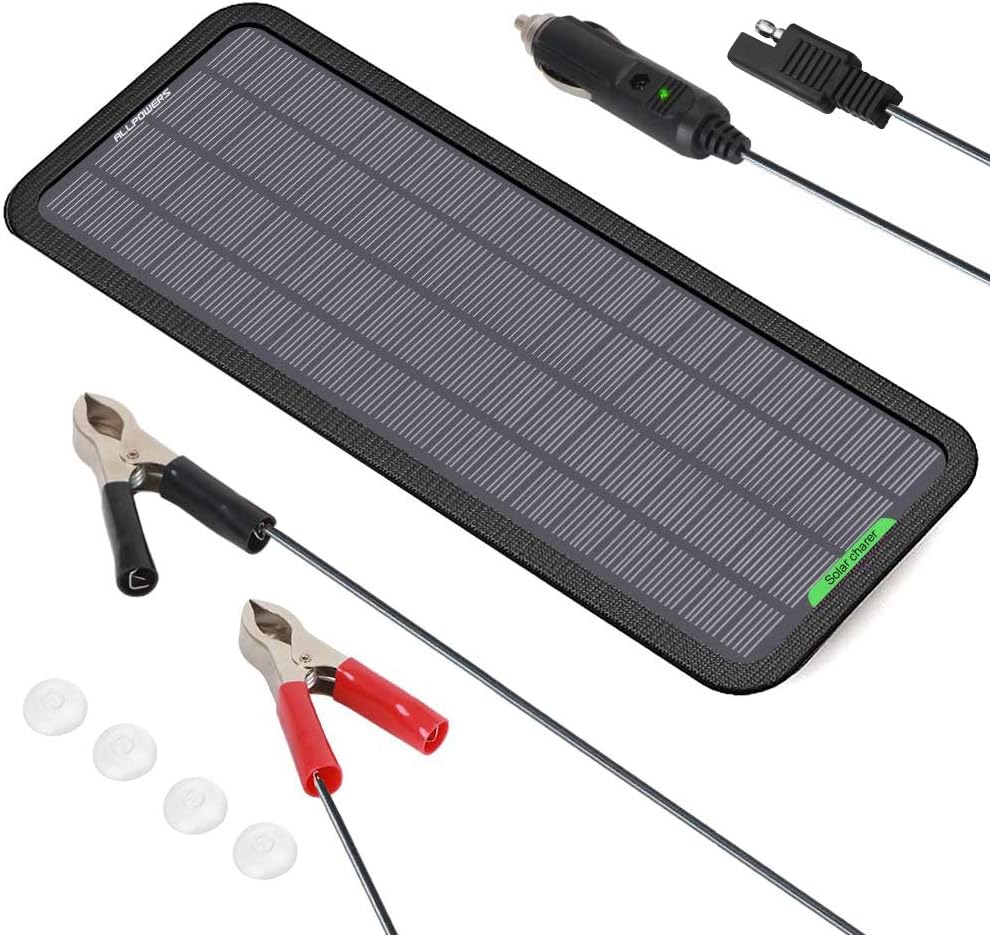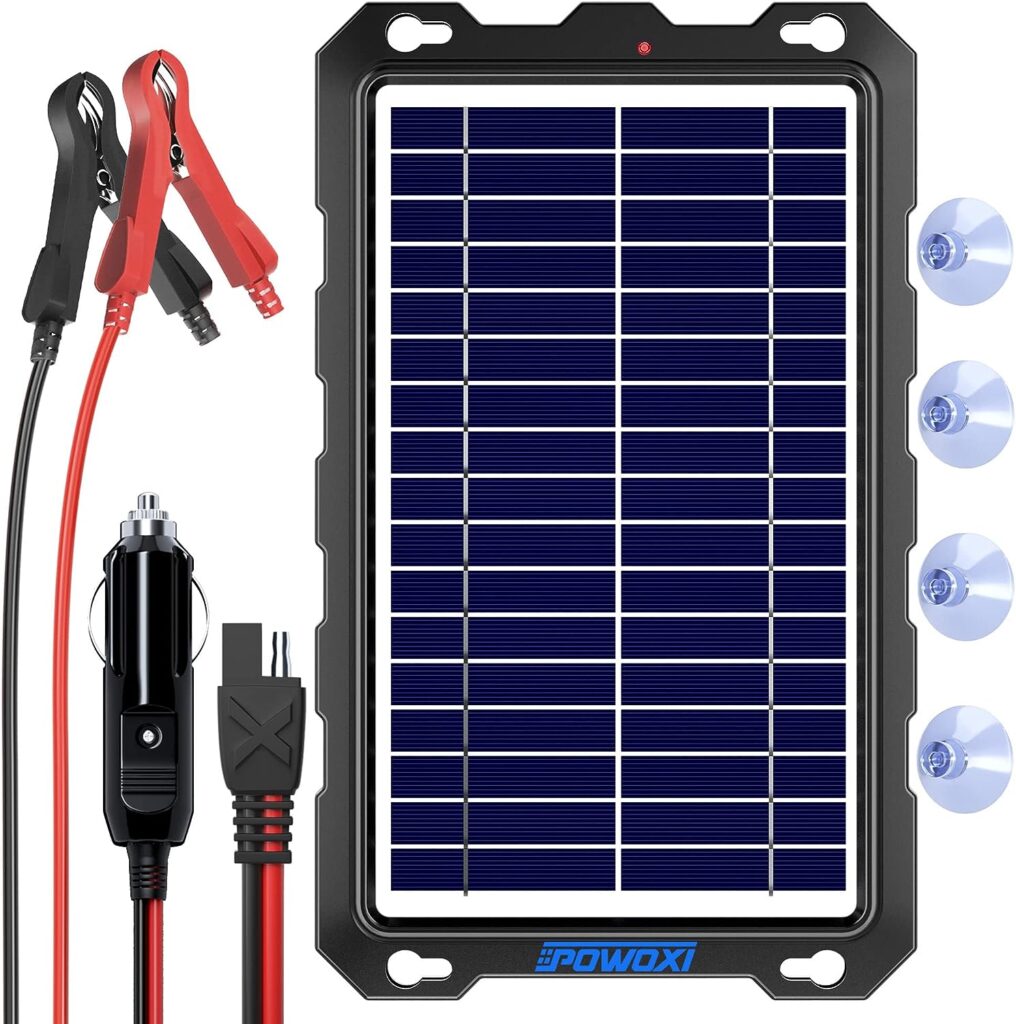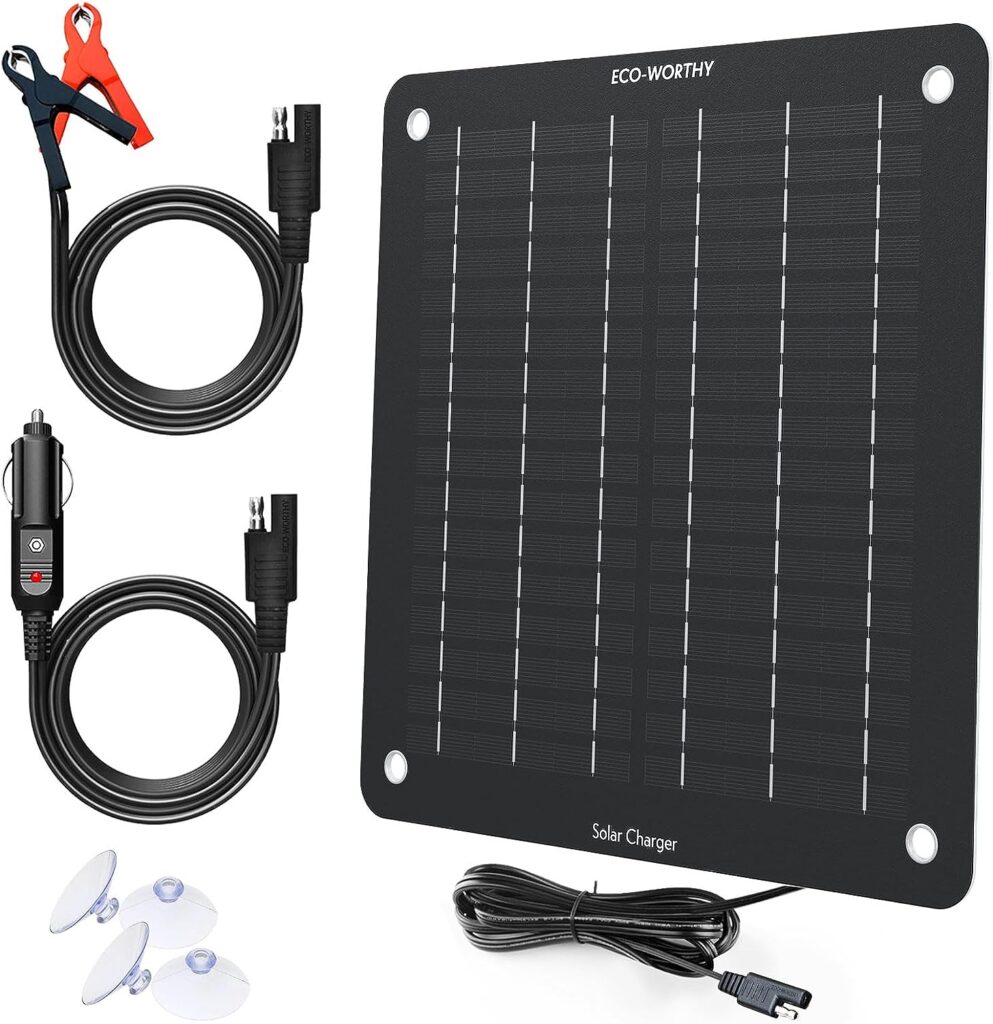Solar chargers are a great way to keep your boat battery-powered without relying on shore power or a generator.
They can also save you money on fuel and maintenance costs, as well as reduce your environmental impact. But how do you choose the best solar charger for your boat battery?
In this article, we will explain what a solar charger is, how it works, and what factors you should consider when buying one.
What is a Solar Charger for a Boat Battery?
A solar charger for a boat battery is a device that collects energy from the sun and converts it into electricity that can be stored in your battery. It consists of several components:
#1. Solar panels
These are the devices that capture the sunlight and convert it into direct current (DC) electricity.
They are usually made of silicon cells that have a high efficiency of converting solar energy into electricity.
Solar panels come in different sizes, shapes, and types, such as monocrystalline, polycrystalline, or thin-film.
#2. Charge controller
This is the device that regulates the voltage and current from the solar panels and prevents overcharging or undercharging of the battery.
It also protects the battery from reverse polarity, short circuits, or overloading.
Some charge controllers have additional features, such as LCD displays, USB ports, or temperature sensors.
#3. Battery
This is the device that stores the electricity from the solar charger and provides power to your boat’s electrical system.
The battery capacity and type will determine how long you can run your devices on solar power.
The most common types of batteries for boats are lead-acid, lithium-ion, or gel.
How Does a Solar Charger for a Boat Battery Work?
The basic principle of a solar charger for a boat battery is simple. The solar panels collect the sunlight and convert it into DC electricity, which is then sent to the charge controller.
The charge controller regulates the voltage and current and sends the appropriate amount of electricity to the battery.
The battery then stores the electricity and provides power to your boat’s electrical system when needed.
The amount of electricity that a solar charger can produce depends on several factors, such as the size and efficiency of the solar panels, the angle and orientation of the panels, the weather conditions, and the time of the day.
The amount of electricity that a battery can store and provide depends on its capacity, type, and state of charge.
Top 5 Best Best Solar Charger For Boat Battery
1. Upgraded 7.5W-Solar-Battery-Trickle-Charger-Maintainer-12V Portable Waterproof Solar Panel Trickle Charging Kit
This is a high quality and durable solar charger that can maintain and extend the life of your 12V batteries. It has a built-in diode to prevent reverse charging and a suction cup to attach to the windshield or dashboard.
It also comes with a cigarette lighter plug and alligator clips for easy connection. It is suitable for cars, motorcycles, boats, RVs, trailers, power sports, snowmobiles, etc
2. SOLPERK Solar Panel Kit 20W 12V, Solar Battery Trickle Charger Maintainer + Upgrade Controller + Adjustable Mount Bracket
This is a powerful and efficient solar charger that can provide up to 20W of electricity for your 12V batteries.
It has an upgraded controller that can display the real-time charging status and parameters, as well as protect the battery from overcharge, over-discharge, overload, short circuit, reverse polarity, etc.
It also has an adjustable mount bracket that can tilt the solar panel to get the best angle and exposure. It is compatible with boats, cars, RVs, motorcycles, marine, automotive, etc
3. All powers 12v 5w portable solar-panel car boat power battery charger for automobile, motorcycle- Black

This is a portable and lightweight solar charger that can easily fit in your backpack or glove box. It can generate up to 5W of electricity for your 12V batteries.
It has a built-in blocking diode to prevent reverse discharge and a blue indicator light to show the working status.
It also comes with a cigarette lighter adapter and a pair of battery clips for convenient connection. It is ideal for automobiles, motorcycles, boats, etc
4. ECO-WORTHY 12 Volts 5 Watts Portable Power Solar Panel Battery Charger Backup for Car Boat Batteries
This is a simple and eco-friendly solar charger that can keep your 12V batteries topped up. It has a monocrystalline solar panel that can deliver up to 5W of electricity.
It has a blocking diode to prevent reverse charging and a clip-on crocodile plug for quick connection. It is designed for cars, boats, batteries, etc.
What Factors Should You Consider When Buying a Solar Charger for Boat Battery?
There are many solar chargers for boat batteries available on the market, but not all of them are suitable for your needs.
Here are some factors that you should consider when buying a solar charger for boat battery:
#1. Battery type
Different types of batteries have different charging requirements and compatibility with solar chargers.
For example, lead-acid batteries need a multi-stage charging process, while lithium-ion batteries need a constant current and voltage.
You should check the specifications of your battery and the solar charger to make sure they are compatible.
#2. Battery capacity
The battery capacity is measured in amp-hours (Ah) and indicates how much electricity the battery can store and provide.
The higher the capacity, the longer you can run your devices on solar power.
However, the higher the capacity, the heavier and more expensive the battery. You should choose a battery capacity that matches your power consumption and budget.
#3. Solar panel size
The solar panel size is measured in watts (W) and indicates how much electricity the panel can produce.
The higher the wattage, the more electricity the panel can produce. However, the higher the wattage, the larger and more expensive the panel.
You should choose a solar panel size that matches your battery capacity and available space on your boat.
#5. Solar panel type
The solar panel type refers to the material and technology used to make the panel.
The most common types are monocrystalline, polycrystalline, and thin-film. Monocrystalline panels have the highest efficiency and durability, but they are also the most expensive and sensitive to shading.
Polycrystalline panels have a lower efficiency and durability, but they are cheaper and more tolerant to shading.
Thin-film panels have the lowest efficiency and durability, but they are the cheapest and most flexible.
#6. Charge controller type
The charge controller type refers to the method and features of the controller.
The most common types are pulse width modulation (PWM) and maximum power point tracking (MPPT).
PWM controllers are simpler and cheaper, but they have a lower efficiency and accuracy.
MPPT controllers are more complex and expensive, but they have a higher efficiency and accuracy.
They can also adjust the voltage and current to match the optimal power point of the solar panels and the battery.
#7. Additional features
Some solar chargers for boat batteries have additional features that can enhance their performance and convenience.
For example, some have LCD displays that show the charging status and parameters, USB ports that allow you to charge your devices directly, or temperature sensors that adjust the charging voltage according to the ambient temperature.
You should consider whether these features are useful and worth the extra cost for you.
Conclusion
A solar charger for a boat battery is a great way to keep your boat battery powered without relying on shore power or a generator.
It can also save you money on fuel and maintenance costs, as well as reduce your environmental impact.
However, you need to choose the best solar charger for your boat battery according to your battery type, capacity, solar panel size, type, charge controller type, and additional features.
We hope this article has helped you understand what a solar charger for a boat battery is, how it works, and what factors you should consider when buying one.
If you have any questions or comments, please feel free to leave them below. Happy boating!








